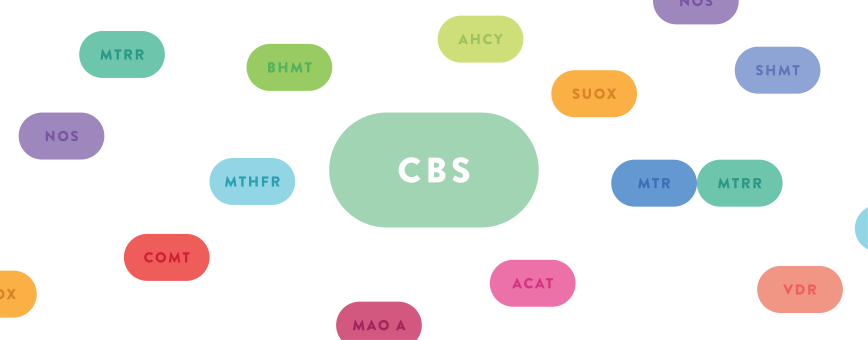The VDR gene gives your body instructions on how to make a protein called vitamin D receptor (VDR). These receptors allow your body to respond to vitamin D.1
Vitamin D is associated with maintaining proper balance and absorption of calcium and phosphate in your body, both of which are essential minerals for the normal formation and maintenance of bones and teeth.2,3
Mutations in this gene typically result in functional, but less efficient, receptors. Dr. Amy’s panel is designed to look at two different sites within the gene, called Taq and Fok.
The VDR Taq site plays a role in calcium homeostasis, helps regulate the growth of skin cells and hair, and may also influence dopamine levels.2,4,5 Changes in the VDR Fok site are associated with the regulation of blood sugar and hypertension.6
A Note From Dr. Amy
The COMT gene is also involved in dopamine regulation. For this reason, it is important to look at both your COMT status and your VDR Taq status when considering what supplementation will work best for your genetics. This is outlined in the results tables where it is applicable.
I’m not sure if I have a VDR mutation, how can I find out?
Our DNA Nutrigenomic Test identifies a custom panel of 30 single nucleotide polymorphisms (SNPs), designed by Dr. Amy. This panel is designed to look at two different sites within the gene, called Taq and Fok.
While there are thousands of genes and SNPs that can be examined, Dr. Amy has designed The DNA Nutrigenomic Test panel to focus on 30 SNPs that are part of the methylation cycle. This is a key nutritional pathway in the body that is central to health.
Many of the SNPs in Dr. Amy’s custom panel are in the control or regulatory portion of the gene, meaning these SNPs can have a significant impact on your health. These include some of the more unique SNPs on this panel and are not always covered by other DNA profile tests.
The analysis includes supplement suggestions based on personalized results and provides a comprehensive assessment of the methylation cycle. Proper function of the methylation cycle is essential for several key pathways in the body. When genetic mutations, or “weaknesses”, are present in this cycle, there may be increased risk factors for a range of health concerns. To learn more about the DNA Nutrigenomic Test and The Yasko Protocol, read our Getting Started Packet here.
How can I support my VDR mutation?
Nutrigenomic pathways are different between individuals and proper supplementation can help support specific imbalances. Holistic Health International offers a variety of supplements to support a VDR mutation within the SNP Support Category here.
Pancreas Health™ capsules were originally named after those with VDR/FOK SNPs in their genetics, these capsules contain a proprietary blend that offers a wide spectrum of benefits, even if you don’t know your genetics. Designed to help support and maintain pancreatic health. Formulated with gymnema sylvestre, chromium, and vanadium – a power-packed combination that offers wide-ranging benefits to support a healthy pancreas.
You do not need to use every supplement listed in each category! Supplements are provided as options to discuss with your own health care professional, to gradually add in as you feel they are needed, and for additional consideration based on biochemical test results.
The beauty of looking at targeted SNPs in the methylation cycle is that it’s a nutritional pathway, meaning if you find a mutation or imbalance in your system, you have ways to support or bypass them.
The information expressed on this webpage does not constitute an attempt to practice medicine nor does it establish a doctor-patient relationship. Content on the site is for informational and educational purposes only. The information expressed is not meant to replace you working with a physician or health care practitioner.
Information and statements have not been evaluated by the U.S. Food & Drug Administration (FDA) and are not intended to diagnose, treat, cure or prevent any disease or be used as the basis for treating a particular symptom or disease. Any products discussed or endorsed are not intended to diagnose, treat, cure or prevent any diseases or be used as the basis for treating a particular symptom or disease. If you have specific healthcare concerns or questions about the products displayed, contact your licensed healthcare professional for advice or answers.
References:
1. VDR vitamin D receptor [ Homo sapiens (human) ]. 04/17/2023. Accessed 04/25/2023. https://www.ncbi.nlm. nih.gov/gene/7421
2. VDR gene vitamin D receptor. 12/1/2017. https:// medlineplus.gov/genetics/gene/vdr/
3. P11473 · VDR_HUMAN. Accessed 04/25/2023. https:// www.uniprot.org/uniprotkb/P11473/entry
4. Redenšek S, Kristanc T, Blagus T, Trošt M, Dolžan V. Genetic Variability of the Vitamin D Receptor Affects Susceptibility to Parkinson’s Disease and Dopaminergic Treatment Adverse Events. Front Aging Neurosci. 2022;14:853277. doi:10.3389/ fnagi.2022.853277
5. Lv L, Tan X, Peng X, et al. The relationships of vitamin D, vitamin D receptor gene polymorphisms, and vitamin D supplementation with Parkinson’s disease. Transl Neurodegener. Sep 01 2020;9(1):34. doi:10.1186/s40035- 020-00213-2
6. Swapna N, Vamsi UM, Usha G, Padma T. Risk conferred by FokI polymorphism of vitamin D receptor (VDR) gene for essential hypertension. Indian J Hum Genet. Sep 2011;17(3):201-6. doi:10.4103/0971-6866.92104











